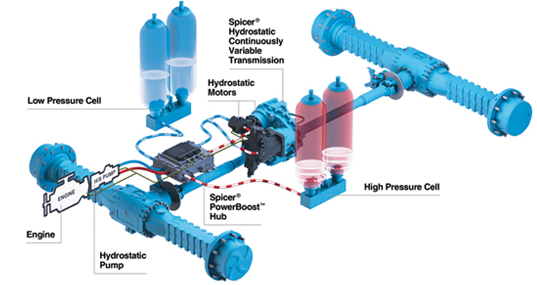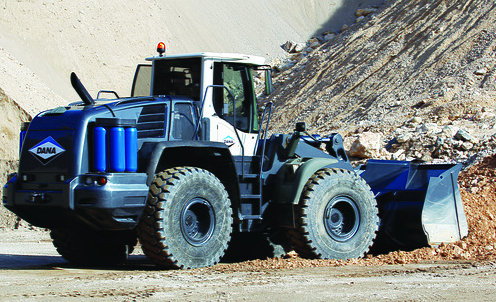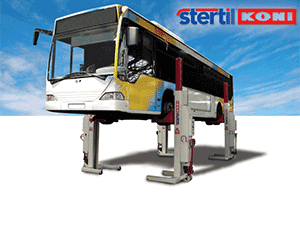Dana to Field Test Spicer® PowerBoost® Hydraulic-Hybrid
Dana Holding Corporation (NYSE: DAN) has announced that the company is now offering its Spicer® PowerBoost® hydraulic-hybrid system for field testing by off-highway original-equipment manufacturers (OEMs).
The Spicer PowerBoost system works by capturing hydrostatic energy in an accumulator from the powertrain during low-power operation of the engine and when recuperated from braking. Deployed through series or parallel hybrid configurations that fit into existing vehicle designs with minimal adaptation, the Spicer PowerBoost system supplements all types of transmission architectures.
It captures kinetic energy otherwise wasted throughout the drivetrain and working hydraulics and then uses this recuperated energy to help power the vehicle, which can reduce fuel consumption by 20 to 40 percent compared with conventional drivetrain concepts, depending on vocational application and duty cycle. Spicer PowerBoost technology can also reduce total ownership and operating costs by increasing productivity, reducing maintenance, and allowing for the use of a downsized engine.
Dana engineers have conducted extensive field tests of the Spicer PowerBoost system integrated with a dual-motor hydrostatic transmission in a series configuration. These functional evaluations include more than 1,000 hours on a 16-tonne (17.5-ton) front-end loader and more than 500 hours on a telescopic boom handler powered by an 83 kW (111 hp) engine.
These tests of typical duty cycles have verified fuel savings of over 20 percent for the front-end loader and over 25 percent on the telescopic boom handler, with an expected payback in under 18 months for both applications.
Spicer PowerBoost hydraulic-hybrid technology is ideally suited for hydrostatically driven drivetrains, which is why Dana will feature it at Intermat as part of a complete drivetrain system for a compact telescopic boom handler with 2.7- to 3.6-tonne (6k to 8k) lifting capacity.
This system includes a next-generation, two-speed Spicer Model 367 shift-on-fly hydrostatic transmission with new power takeoff (PTO) disconnect functionality, Spicer Model 211 planetary steer axles, and a Spicer® 10 Series® driveshaft.
 This configuration demonstrates how off-highway manufacturers can potentially reduce the engine size for applications that currently require an engine at or slightly above the U.S. EPA’s Tier 4 or Euro 5/6 emissions threshold of 75 hp (56 kW). The Spicer PowerBoost system allows manufacturers to select a smaller engine that does not require exhaust after treatment systems that are costly, consume added space, and increase the operating temperature of the powertrain system.
This configuration demonstrates how off-highway manufacturers can potentially reduce the engine size for applications that currently require an engine at or slightly above the U.S. EPA’s Tier 4 or Euro 5/6 emissions threshold of 75 hp (56 kW). The Spicer PowerBoost system allows manufacturers to select a smaller engine that does not require exhaust after treatment systems that are costly, consume added space, and increase the operating temperature of the powertrain system.
“Despite the recent downturn in diesel prices, off-highway equipment buyers are still actively pursuing technologies that can reduce overall vehicle operating expenses,” said Aziz Aghili, president of Dana Off-Highway Driveline Technologies. “The financial benefits of the Spicer PowerBoost system have been clearly demonstrated in real-world field tests on multiple applications and include significant machine productivity enhancements as well as reduced maintenance.”
Spicer PowerBoost technology uses an advanced energy-management system to evaluate the levels of power needed in the entire vehicle, predict operating demands, and determine the most efficient means of operation.
This system features a modular design that offers OEMs flexibility in hybrid control performance, which can include hydraulic start/stop functionality for use with electronically controlled powertrains, integration with hydraulic work circuits, and other options depending on customer powertrain configuration.













